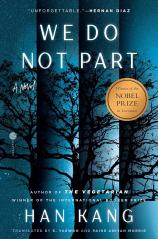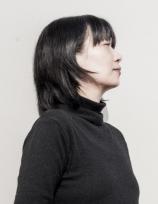Excerpt
Excerpt
We Do Not Part

1
Crystals
A sparse snow was falling.I stood on flat land that edged up a low hill. Along the brow of this hill and down its visible face to the seam of the plain, thousands of black tree trunks jutted from the earth. They varied in height, like a crowd of people ranging in age, and were about as thick as railway sleepers, though nowhere near as straight. Stooped and listing, they gave the impression of a thousand men, women, and haggard children huddling in the snow.
Was this a graveyard? I wondered. Are these gravestones?
I walked past the torsos—treetops lopped off, exposed cross sections stippled with snowflakes that resembled salt crystals; I passed the prostrating barrows behind them. My feet stilled as I noticed the sensation of water underfoot. That’s strange, I thought. Within moments the water was up to my ankles. I looked back. What I saw astonished me: the far horizon turned out to be the shoreline. And the sea was crashing in.
The words tumbled from my lips: Who would bury people in such a place?
The current was strong. Had the tide surged in and out like this each day? Were the lower mounds hollowed out, the bones long since swept away?
There was no time. The graves already underwater were out of reach, but the remains higher up the slope, I needed to move them to safety. Now, before the sea encroached further. But how? There was no one around. I had no shovel. How would I get to them all? At a loss, I ran through the thicket of black trees, knees cleaving the rising water.
When I opened my eyes, the day had yet to break. The snowy field, the black torsos, the flood tide were gone; the only thing that met my stare was the window of my darkened room. I shut my eyes. Another dream about G—, it had to be. At this thought, I covered my lids with the cold palm of my hand and lay there unmoving.
The dream had come to me in the summer of 2014, a couple of months after the publication of my book about the massacre in G—. Over the next four years, it had never occurred to me to question the dream’s connection to that city. But this summer I began to wonder if there might be something more to it. If my quick, intuitive conclusion had either been in error or an oversimplification.
The sweltering night heat hadn’t let up for three weeks. Once again, I was lying under the broken air conditioner in my sitting room, hoping for sleep. I’d already taken several cold showers, but though I lay on the bare floor, my sweat-drenched body wouldn’t cool. Finally, around five in the morning, the temperature began to drop. It was to be a brief grace, as the sun would be up in another half hour. But I felt I might sleep at last, and had in fact nearly drifted off, when the plain rolled in beneath my closed lids: snow scattering over rows of black timber; glimmering snowflakes studding the severed torsos like salt; all of it before my eyes, as vivid as day.
I don’t know what set it off, the shaking. My body seemed to be racked by sobs, though my eyes remained dry. Was this terror? Or anxiety, agitation, perhaps an abrupt anguish? No, it was a bone-chilling awareness. That a giant, invisible knife—the weight of its heavy blade beyond any human capacity to wield it—hung in the air, with me as its target. As I lay pinned and staring.
The black-blue sea billowing in to dredge the bones away from beneath the mounds—it occurred to me for the first time that this might not be an allusion to the massacred people and the decades that followed. It could simply be a personal omen. Yes, perhaps that landscape of flooded graves and silent headstones was an intimation brought forward in time, a sign of what remained of my life to come.
This very moment, in other words.
In the four years between the first time I had the dream and that early summer morning, I had parted ways with several people in my life. Some of these partings had been by choice, while others had caught me entirely unawares; I’d fought the latter with everything I had. If, as various ancient faiths say, there exists in a celestial realm or a netherworld an immense mirror that observes and logs everyone’s movements, I’m sure the last three to four years of my life as recorded there must resemble a snail coming out of its shell to push along a knife’s edge. A body desiring to live. A body pricked and nicked. A body spurning, embracing, clinging. A body kneeling. A body entreating. A body seeping blood or pus or tears.
Then in late spring of this year, with the struggle done, I had signed the lease on a flat in an open-corridor apartment complex just outside Seoul. I had no one left to take care of and no job to get to, though it would take a while for this fact to sink in. I’d worked for many years to make a living and support my family. This had always been the priority. If I wrote at all, it was by cutting back on sleep while nursing a secret hope that one day I’d be given as much time as I desired to write. But by spring any such longing had vanished.
I let my things lie wherever the movers had blithely unpacked them, and spent most of my time in bed, though I barely slept. This went on until July. I didn’t cook. I didn’t venture outside. I subsisted on water and small quantities of rice and white kimchi that I ordered online and had delivered, and when the migraines and abdominal spasms hit, I vomited up what I had eaten. I’d already sat down one night and written out a will. In a letter that simply began Please see to the following, I had briefly noted which box in which drawer held my bank books, certificate of insurance, and lease agreement, how much of my money I wished to be spent to what end, and to whom the rest of my savings should be delivered. As for the person who was to carry out this request, I drew a blank, and the space where the name of the recipient should go remained empty. I couldn’t decide who, if anyone, deserved such an imposition. I tried adding a word or two of thanks and apology by saying I’d make sure to compensate them for their trouble and specifying an amount, but I still couldn’t settle on a name.
What finally roused me out of the mire of my bed, after weeks of struggling to sleep, was my sense of responsibility toward this unidentified recipient. Calling to mind my few acquaintances, one of whom, though the exact person was yet to be determined, would be left to deal with any loose ends, I started putting the flat in order. The rows of empty water bottles in the kitchen, the clothing and blankets that were sure to be a nuisance, any personal records, diaries, and notes had to be discarded. With the initial bundles of trash in each hand, I slipped on a pair of sneakers and opened the front door for the first time in two months. The summer sun flooded the west-facing corridor; the afternoon light was a revelation. I rode the elevator down, passed by the guard’s room, crossed the compound square—and felt, all the while, that I was witnessing something. The lived-in world. The day’s weather. The humidity in the air and the pull of gravity.
Returning upstairs, I walked past the mounds of fabric and into the bathroom. I turned the hot water on and sat under the shower fully dressed. The tiles beneath my curled feet, the steam gradually making it hard to breathe, the cotton shirt growing heavy as it plastered against my back, the water sluicing down my forehead, and the hair, which by now covered my eyes to my chin, chest, stomach: I can feel each and every sensation still.
I walked out of the bathroom, peeled off my sodden outfit, rummaged around and put on what decent clothes I could find. I folded two 10,000-won notes into little squares, slipped them into my pocket, and went outside. I walked to a juk shop behind a nearby subway station and ordered what seemed the mildest item on their menu, a pine-nut juk. I took my time with the unduly hot bowl of rice porridge and, as I did, people walked past the window in bodies that looked fragile enough to shatter. Life was exceedingly vulnerable, I realized. The flesh, organs, bones, breaths passing before my eyes all held within them the potential to snap, to cease—so easily, and by a single decision.
That is how death avoided me. Like an asteroid thought to be on a collision course avoids Earth by a hair’s breadth, hurtling past at a furious velocity that knows neither regret nor hesitation.
Excerpted from WE DO NOT PART by Han Kang. Copyright © 2025 by Han Kang. All rights reserved. No part of this excerpt may be reproduced or reprinted without permission in writing from the publisher.
We Do Not Part
- Genres: Fiction
- hardcover: 272 pages
- Publisher: Hogarth
- ISBN-10: 0593595459
- ISBN-13: 9780593595459



